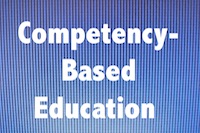A Delphi study of effective practices for developing competency-based learning models in higher education
There are over 600 universities developing competency-based education (CBE) programs in response to student and employer desire to bridge the gap between academic outcomes and employer needs (Fain 2015, https://www.insidehighered.com/news/2015/09/10/amid-competency-based-education-boom-meeting-help-colleges-do-it-right). However, research is still emerging on effective practices for developing CBE programs.
Methods
The purpose of this qualitative Delphi study was to gather expert opinions about effective practices for developing competencies, assessments, and learning resources in CBE programs in higher education. Ten specialists in developing CBE programs served as participants. Data from three rounds of interviews were coded and categorized, using Delphi methodology.
Findings
Eighteen principles for effective practices were agreed upon for developing competencies, 15 principles for effective practice were agreed upon for developing assessments, and 16 principles for effective practice were agreed upon regarding learning resources. Areas of disagreement were also identified, with evidence that variation was due to the unique contexts of higher education programs.
Conclusion
This study contributes to CBE by providing an emerging list of effective practices useful in developing CBE programs.








